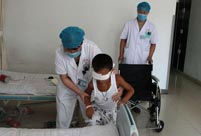NANNING, Sept. 6 -- The "diamond decade" newly proposed by Chinese Premier Li Keqiang presages deeper economic cooperation and a brighter future for the China-ASEAN Free Trade Area.
While addressing the opening ceremony of the 10th China-ASEAN Expo Tuesday, Li called for building a community of common destiny with the Association of Southeast Asian Nations (ASEAN) to share peace and prosperity.
"We unanimously agreed that our common interests are expanding. We had the capabilities to create a 'golden decade' in the past. We also have the power to create a 'diamond decade' in the future," said Li.
The four-day expo, which closed Friday in Nanning, capital of south China's Guangxi Zhuang Autonomous Region, has consolidated its place as an important platform to promote trade and relationships between China and the ASEAN.
CLOSER, STRONGER
"The economic connection between China and ASEAN has never been so close and interdependent as today," said the premier.
Li said China and ASEAN members are capable of coping with various difficulties and challenges, and by joining hands and helping each other, they are able to maintain steady economic growth and financial stability in the region.
The premier has signaled that if the regional economy is once again faced with difficulty, China is ready to work with ASEAN members to cope with it, said Huang Zhiyong, deputy president of the Guangxi Academy of Social Sciences.
Fears over financial volatility in some emerging economies have recently been rekindled due to increasing expectations that the United States might withdraw its quantitative easing monetary policies.
Once some countries are in financial volatility and economic crisis, the neighbors would not likely be immune to the impact, said Huang.
When a financial crisis swept across Southeast Asia in 1997, China refused to depreciate its currency, the Renminbi, providing a strong support to countries in the region. In the last crisis, which started in 2007, China also rolled out a slew of measures to support regional economic and financial stability.
China's central bank deputy governor, Yi Gang, told the expo the bank has signed bilateral local currency swap agreements with counterparts in Asia totaling 1.4 trillion yuan (229 billion U.S. dollars).
Li stressed that China-ASEAN financial cooperation is "extremely crucial to safeguard financial and economic stability in the region."
Jonathan Chon, chairman with the Sunwah Group and honorary president of the Chinese Chamber of Commerce, said Southeast Asian countries are short of foreign exchange reserves and therefore China is regarded as a principal partner in financial cooperation for its adequate foreign exchange reserves.
Chon also called for the establishment of China-ASEAN Bank to support major projects to help usher in the "diamond decade."
The past decade of China-ASEAN cooperation has witnessed a remarkable increase in bilateral trade, which surged from 54.77 billion U.S. dollars in 2002 to 400.1 billion U.S. dollars in 2012, an annual growth rate of 22 percent.
To deepen economic cooperation, Li proposed "an upgraded version" of the China-ASEAN Free Trade Area, the world's largest free trade area among developing countries, adding China will strive to more than double the bilateral trade to 1 trillion U.S. dollars by 2020.
LESS NOISE, FEWER BARRIERS
Huang said the much anticipated China-ASEAN "diamond decade" calls for closer bilateral collaboration and fewer barriers to develop the economy and improve people's well-being.
Premier Li's introduction on China's current economic situation sent the world a message of confidence in the world's second-largest economy and, more importantly, injected confidence into the region's future, Huang said.
Li said that China will prioritize ASEAN member countries in the country's peripheral diplomacy, deepen strategic partnership with the ASEAN, and cooperate with the ASEAN to jointly safeguard peace and stability in the region, including the South China Sea.
The premier declared China's position and proposition on the South China Sea issue and demonstrated hope in solving territorial disputes through strengthened maritime cooperation, said Xu Ningning, deputy secretary-general of the China-ASEAN Business Council.
"This serves as a friendly reminder and it also is a rational choice for all ASEAN nations to focus on cooperation rather than being entangled in disputes," said Huang.
China is willing to join hands with the ASEAN to advance talks of the Regional Comprehensive Economic Partnership (RCEP), and discuss interactions with frameworks such as the Trans-Pacific Partnership (TPP) Agreement, so as to create an open, inclusive and mutually beneficial climate to "make the two wheels of regional and global trade roll together," according to the premier.
China is moving to consolidate a stable ASEAN trade partnership through a multi-level approach emphasizing trade and development rather than the military alliance model being pushed in the TPP proposed by the U.S., said Einar Tangen, former chairman of the State of Wisconsin International Trade Council.
Tangen said this is a strategic shift and alternative which will resonate with the population in ASEAN nations more interested in peaceful understanding.
Trade is only one component that China is bringing to the table and infrastructure and culture are the polishing tools of this "diamond decade" transformation initiative, he said.
(Xinhua writers Dong Zhenguo, Xiong Hongming contribute to the story.)
 Mountain of garbage in Nairobi
Mountain of garbage in Nairobi Highlights of MAKS 2013 Int'l Aviation and Space Show
Highlights of MAKS 2013 Int'l Aviation and Space Show  10th China-ASEAN Expo opens in Nanning
10th China-ASEAN Expo opens in Nanning Eagle Boy takes to sky to break another record
Eagle Boy takes to sky to break another record 12-year-old boy becomes pillar of the family
12-year-old boy becomes pillar of the family Eye-gouged boy receives blind rehabilitation in Shanxi
Eye-gouged boy receives blind rehabilitation in Shanxi Top 10 naked hotels in the world
Top 10 naked hotels in the world The most gorgeous Chinese women in the eyes of foreigners
The most gorgeous Chinese women in the eyes of foreigners A collection of bizarre rooftop buildings around China
A collection of bizarre rooftop buildings around China Putin intimate contacts with marine animals
Putin intimate contacts with marine animals China's frigate 'Bengbu'in fire training
China's frigate 'Bengbu'in fire training Fresh students 'forced' to register in university independently
Fresh students 'forced' to register in university independently 2013 Taiwan Int'l Tourism Expo kicks off in Taipei
2013 Taiwan Int'l Tourism Expo kicks off in Taipei Photo story: Take a gap year
Photo story: Take a gap year Nokia's Global Headquarters: visiting a declining empire
Nokia's Global Headquarters: visiting a declining empireDay|Week|Month